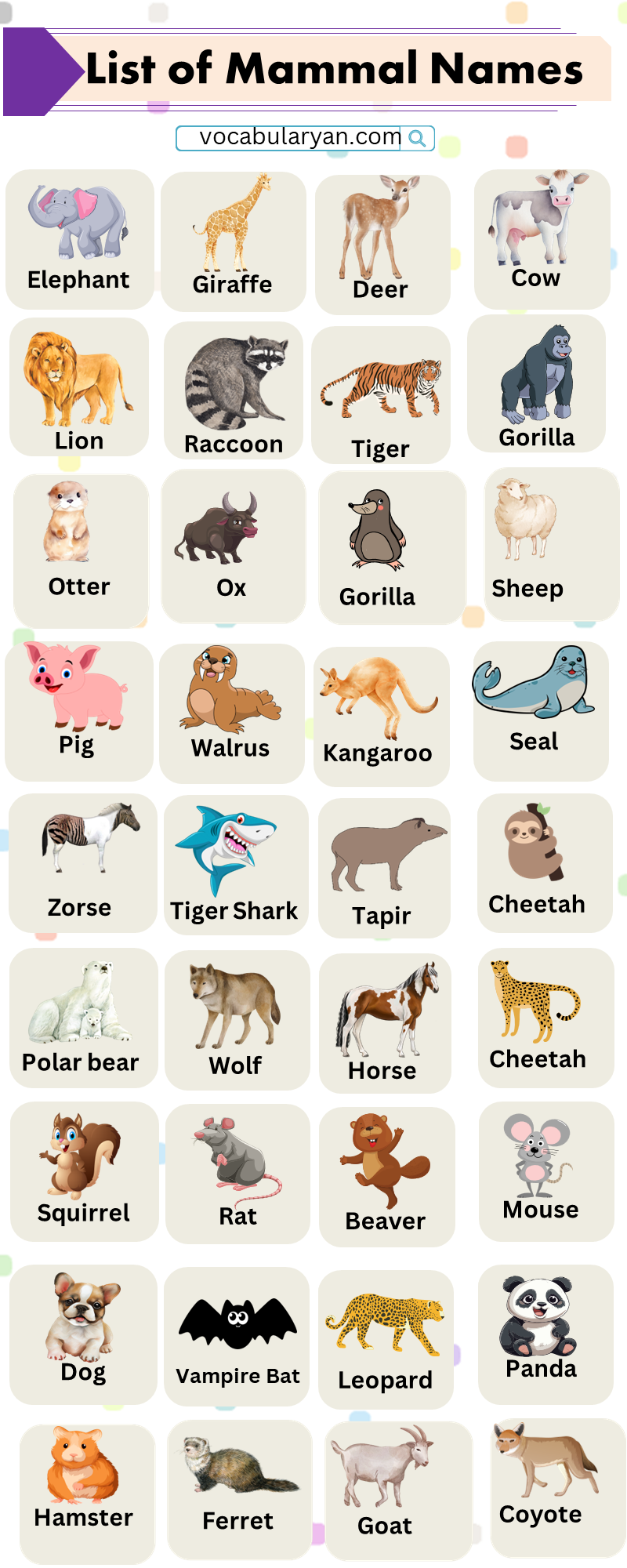Learning mammal names helps you identify and talk about animals in English. It improves how you speak in school, nature lessons, or everyday chats. You’ll learn with helpful pictures that make each name easier to remember. Mammals are animals with hair or fur that feed their babies milk. Most give birth to live young and breathe through lungs. From pets to wild animals, these names have practical use. You’ll sound more natural and confident in English.
Common Mammal Names
You can see many of the Mammals around your home, in cities, farms, or nature. Here is a list of Mammal names which will helps in everyday conversations and school learning.
- dog
- cat
- rabbit
- cow
- horse
- goat
- sheep
- pig
- rat
- mouse
- squirrel
- bat
- deer
- monkey
- bear
- lion
- tiger
- elephant
- camel
- dolphin
- whale
- seal
- fox
- wolf
- kangaroo
- panda
- giraffe
- zebra
- otter
- hedgehog
- mole
- raccoon
- chimpanzee
- gorilla
- buffalo
- leopard
- hamster
- yak
- alpaca
- manatee
- platypus
- walrus
- lynx
- boar
- beaver
- possum
- armadillo
- sloth

Common Mammal Names You See Every Day
These mammals are a regular part of human life. You can see them in cities, homes, farms, or nearby fields. They’re useful to learn because they appear in daily conversations.
Mammals Found Around Homes and Cities
These mammals are often seen near people, in parks, roads, or rooftops.
- dog
- cat
- rat
- mouse
- bat
- squirrel
- monkey
- raccoon
- opossum
- mole
- hedgehog
- skunk
Mammals Commonly Kept as Pets
These animals live with humans for comfort, security, or companionship.
- dog
- cat
- rabbit
- hamster
- guinea pig
- ferret
- hedgehog
- chinchilla
- gerbil
- miniature pig
Wild Mammal Names
Wild mammals live in forests, deserts, and remote places. They survive without human help. Knowing their names helps in nature talks and wildlife education.
Mammals Found in Forests and Jungles
These animals roam in wooded or tropical areas, often away from cities.
- lion
- tiger
- bear
- leopard
- deer
- fox
- wolf
- boar
- gorilla
- chimpanzee
- orangutan
- jaguar
- lynx
- bison
- sloth
- tapir
- armadillo
Desert and Mountain Mammal Species
These mammals survive in extreme weather, both hot and cold.
- camel
- yak
- snow leopard
- mountain goat
- ibex
- antelope
- jerboa
- fennec fox
- pika
- alpaca
- llama
- dromedary
- oryx
- gazelle
List of Aquatic and Marine Mammals
Though mammals mostly live on land, many live in oceans, rivers, and lakes. They still need air to breathe and nurse their young.
Mammal Names That Live in Water
These mammals are skilled swimmers and spend most of their time in water.
- whale
- dolphin
- manatee
- sea lion
- otter
- beaver
- platypus
- water vole
- capybara
- river dolphin
Sea Mammals Found Near the Coast
These mammals stay close to shores and shallow waters.
- seal
- sea otter
- walrus
- dugong
- harbor porpoise
- narwhal
- beluga whale
- elephant seal
- gray whale
- bottlenose dolphin
Large and Small Mammals Classification
Mammals come in all sizes. Some are very small and others are huge. Size also affects how they live, what they eat, and where they stay.
Tiny Mammals with Examples
These small mammals are lightweight, fast, and often hide easily.
- mouse
- shrew
- hamster
- mole
- bat
- hedgehog
- vole
- dormouse
- pygmy possum
- least weasel
- sugar glider
Big Mammal Species in English
These are among the largest land or sea animals.
- elephant
- hippopotamus
- rhinoceros
- giraffe
- moose
- horse
- cow
- bison
- camel
- blue whale
- orca
- walrus
- elk
Mammal Names for Kids Learning English
Kids can start learning English through simple animal names. These mammals are friendly, easy to remember, and often found in books or cartoons.
Easy-to-Remember Mammals
These mammals are familiar and basic for early learners.
- dog
- cat
- rabbit
- monkey
- bear
- elephant
- lion
- cow
- goat
- horse
Friendly Mammals for Learning Purposes
These mammals are non-threatening and often shown in school books.
- dolphin
- panda
- koala
- deer
- squirrel
- giraffe
- pig
- sheep
- seal
- kangaroo
Fastest and Slowest Mammals on Land and Water
Some mammals are built for speed, while others move slowly for survival or energy saving.
Quickest Running Mammals in the World
These mammals are fast runners or swimmers, built for speed.
- cheetah
- pronghorn
- springbok
- hare
- greyhound
- lion
- wildebeest
- horse
- kangaroo
- dolphin
Mammals Known for Their Slow Movement
These are slower mammals that rely on other ways to survive.
- sloth
- koala
- hedgehog
- manatee
- mole
- wombat
- panda
- armadillo
Mammals are warm-blooded animals that have hair or fur and feed their babies with milk. If an animal has these traits, it’s a mammal.
Yes! Even though they live in water, whales and dolphins are mammals because they breathe air and nurse their babies.
The only mammals that can truly fly are bats. Other animals like flying squirrels can glide but not fly.
Water-dwelling mammals include dolphins, whales, seals, manatees, and otters. They still breathe air and feed their young milk.
You May Also Like
